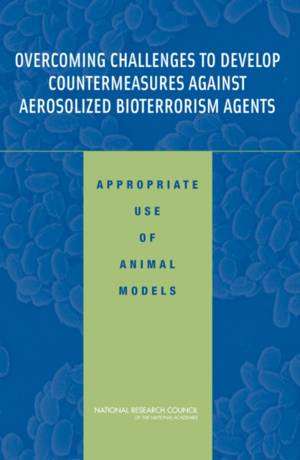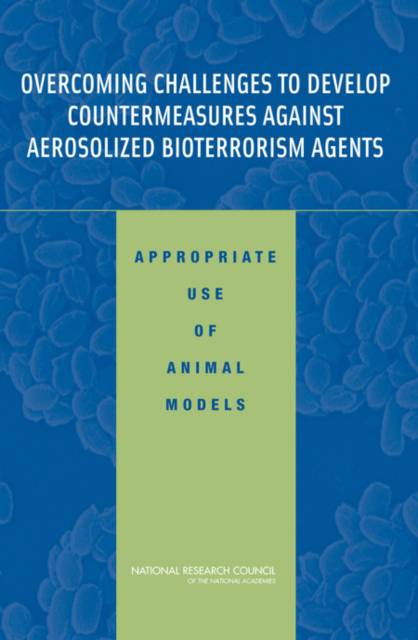
- Afhalen na 1 uur in een winkel met voorraad
- Gratis thuislevering in België vanaf € 30
- Ruim aanbod met 7 miljoen producten
- Afhalen na 1 uur in een winkel met voorraad
- Gratis thuislevering in België vanaf € 30
- Ruim aanbod met 7 miljoen producten
Overcoming Challenges to Develop Countermeasures Against Aerosolized Bioterrorism Agents
Appropriate Use of Animal Models
National Research Council, Division on Earth and Life Studies, Institute for Laboratory Animal Research, Board on Life Sciences, Committee on Animal Models for Testing Interventions Against AerOmschrijving
The National Institute of Allergy and Infectious Diseases (NIAID) gives the highest priority to developing countermeasures against bioterrorism agents that are highly infective when dispersed in aerosol form. Developing drugs to prevent or treat illnesses caused by bioterrorism agents requires testing their effectiveness in animals since human clinical trials would be unethical. At the request of NIAID, the National Academies conducted a study to examine how such testing could be improved. Overcoming Challenges to Develop Countermeasures Against Aerosolized Bioterrorism Agents provides recommendations to researchers on selecting the kinds of animal models, aerosol generators, and bioterrorism agent doses that would produce conditions that most closely mimic the disease process in humans. It also urges researchers to fully document experimental parameters in the literature so that studies can be reproduced and compared. The book recommends that all unclassified data on bioterrorism agent studies--including unclassified, unpublished data from U.S. Army Medical Research Institute of Infectious Diseases (USAMRIID)--be published in the open literature. The book also calls on the U.S. Food and Drug Administration to improve the process by which bioterrorism countermeasures are approved based on the results of animal studies.
Specificaties
Betrokkenen
- Auteur(s):
- Uitgeverij:
Inhoud
- Aantal bladzijden:
- 87
- Taal:
- Engels
Eigenschappen
- Productcode (EAN):
- 9780309102117
- Verschijningsdatum:
- 7/09/2006
- Uitvoering:
- Paperback
- Formaat:
- Trade paperback (VS)
- Afmetingen:
- 152 mm x 229 mm

Alleen bij Standaard Boekhandel
Beoordelingen
We publiceren alleen reviews die voldoen aan de voorwaarden voor reviews. Bekijk onze voorwaarden voor reviews.











